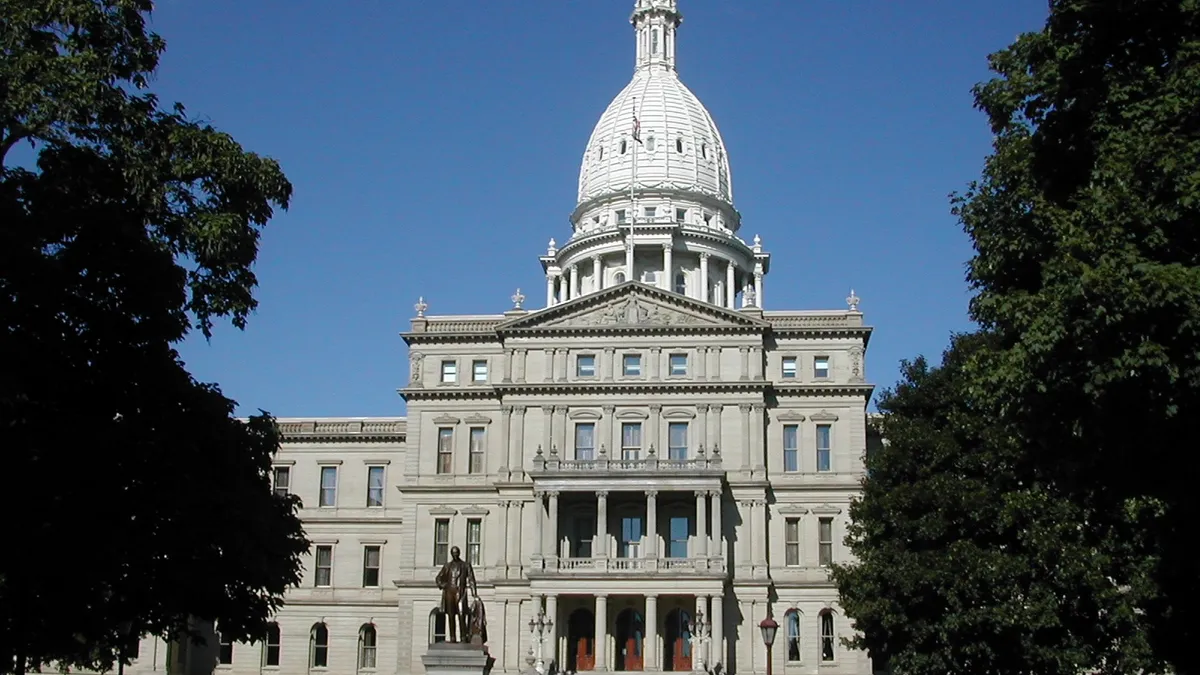Dive Brief:
- Despite a legislative session that stretched 19 hours and adjourned only in the wee hours of Thursday morning, lawmakers still have not reached agreement on changes to Michigan's electricity market and renewables goals.
- Lawmakers adjourned about 5:30 a.m. and are expected to reconvene after lunch, according to media reports. Today is the final day of the legislative session.
- The bill would most controversially impose new restrictions on alternative energy suppliers that serve the 10% of Michigan's electricity market that is open to retail choice. There are also provisions to raise the state's renewable portfolio goals to 15% by 2022.
Dive Insight:
Michigan's long slog to reform its electricity market could find a resolution today — but lawmakers will have to move quickly.
Legislators were expected to vote last night on a sweeping bill that would alter utility planning processes, increase the renewables mandate and tighten rules on alternative energy suppliers. But despite extensive debate so far there has been no final agreement.
Gov. Rick Snyder has been personally involved, meeting with lawmakers until 5 a.m. this morning and telling local media there was still work to be done.
The House will reconvene at 1 p.m. today for the final day of the legislative session.
The sticking point in negotiations is new rules on alternative energy suppliers, including a capacity charge they would have to pay to the state's regulated utilities, according to the Free Press.
Details are still emerging, but the Detroit News reports a nascent compromise brokered by the governor would eliminate a "come and go" charge for customers entering or exiting the retail choice program.
DTE and Consumers Energy — Michigan's large IOUs — say charges or restrictions on alternative suppliers are justified because they must build the generation to serve their customers in most cases. Opponents say new restrictions could kill the state's 10% retail choice market.
Sen. Mike Nofs (R), a bill sponsor, told media outlets the capacity charge could disappear in return for other restrictions on the alternative suppliers. The charge itself was a compromise from earlier proposals to mandate the suppliers secure generation two years in advance.
The higher RPS was proposed in October as a way to bring more Democrats on board with the plan. Final provisions are in flux, but previous iterations included voluntary 35% renewables goal by 2030 and put in place new efficiency programs above the current 1% mandate for annual demand reductions.
Michigan faces the risk of generation shortfalls as soon as next year, and has been working with the Midcontinent ISO to improve planning processes and secure capacity. Should federal regulators take issue with parts of the solution, the legislation under consideration reportedly includes backup provisions.
In June, the ISO warned of potential generation shortfalls as soon as 2018 due to retirement of older coal-fired generators in the state’s lower peninsula, a number that could double by 2021, and Entergy announced last week it would shut down a major nuclear plant in the state.














